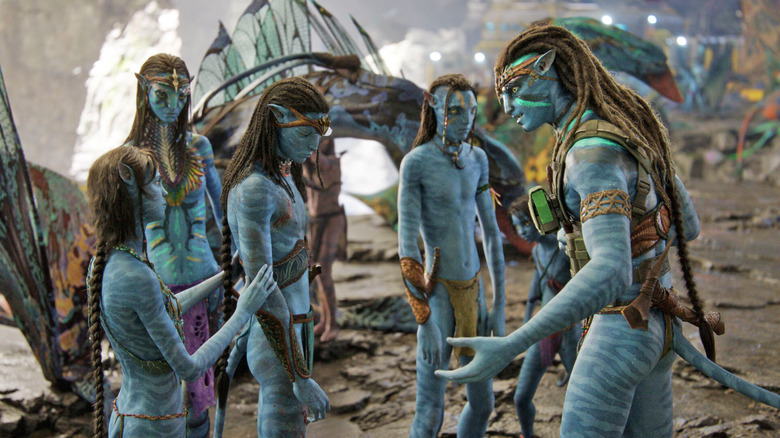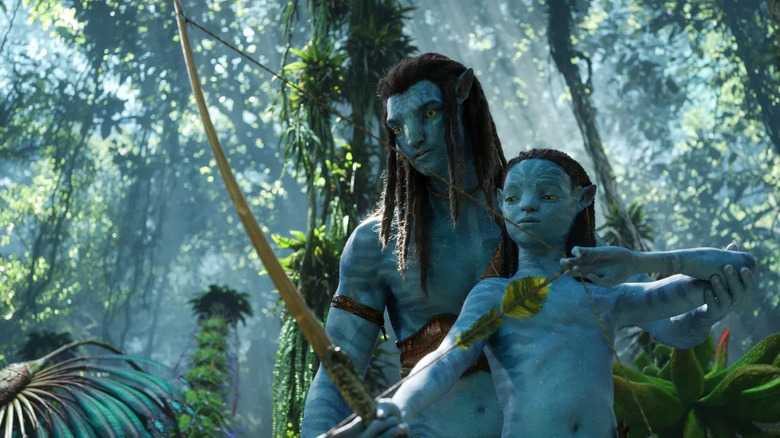James Cameron Thinks A Comparison Between Avatar And Marvel Is 'Irrelevant'
James Cameron's successor to "Avatar" is finally almost here, a mere thirteen years after the original movie set many box office records. The first film was extremely popular, with visuals so appealing that it caused depression in those longing to visit the beautiful, yet tragically fictional, planet of Pandora. The "Avatar" sequels have been planned by Cameron since shortly after the release of the original, showing they are very much part of his genuine artistic vision and aren't simply cash grabs. Despite these positive signs, the long gap between the series' first entry and the second has created some skepticism among audiences and critics.
Many have claimed that "Avatar" certainly broke the mold when it came to its box office earnings, but its lasting cultural impact is pretty negligible, with nobody remembering many of the characters' names, let alone hoping for a sequel over a decade later. Others are doubtful that the movie will be able to earn enough money to justify its massive budget and three years of shooting.
None of these doubts have stopped Cameron, one of the most ambitious directors of his time. Cameron believes that "Avatar: The Way of Water" will silence his critics — and that comparing his series to the massively popular Marvel Cinematic Universe is a pointless exercise.
No comparisons, please
The Marvel Cinematic Universe has solidified itself as the most popular and lucrative film franchise on the planet. While the popular series of superhero films kicked off around the same time as the release of the original "Avatar" film, Marvel has managed to consistently and frequently put out new movies, keeping its series and its characters in the zeitgeist. This is something many claim James Cameron failed to do with "Avatar," with thirteen years creating quite a chasm between the first and the second films in the series.
While critics argue Cameron has missed the window to make "Avatar" a massively successful franchise, the director rebuts this in an interview with The Hollywood Reporter, saying any comparisons between "Avatar" and other film franchises, especially the MCU, are irrelevant.
"There's skepticism in the marketplace around, 'Oh, did it ever make any real cultural impact? Can anybody even remember the characters' names?' ... When you have extraordinary success, you come back within the next three years. That's just how the industry works. You come back to the well, and you build that cultural impact over time. Marvel had maybe 26 movies to build out a universe, with the characters cross-pollinating. So it's an irrelevant argument. We'll see what happens after this film."
He raises a good point about cultural impact, and perhaps we would all remember his characters' names today if "Avatar 2" was rushed out within three years. He notes in the interview that Fox had wanted a quick sequel, and the hiatus was his decision: "I was actually the one putting the brakes on it and saying, 'I don't know if I want to go down this road again.'" Besides, the MCU in particular is a franchise literally unlike anything we've seen before — so any comparison really is apples and oranges.
Belief in himself
It makes sense that the man who created a movie that shattered so many box office records would be confident in his ability to recapture that magic. Still, "The Way of Water" has had many doubters. When the film's more than three hour runtime was revealed, people complained on social media that the runtime was too long. To this, Cameron bemoaned people "whining" about the runtime. If he has any self-doubt, he's keeping it out of the public eye.
It remains to be seen if Cameron's faith in "Avatar: The Way of Water" is misplaced. "Avengers: Endgame" director Joe Russo suggested in a Variety interview that the period of the billion-dollar opening weekend is over in the modern movie landscape; yet, James Cameron believes "Avatar: The Way of Water" will easily supplant that number.
Given his track record, his confidence makes sense — but is it realistic? Cameron is publicly making a huge gamble, and it'll be interesting to see the fallout.


